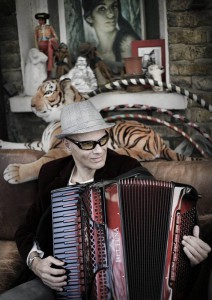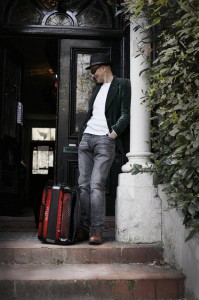 Maurizio Minardi is a musician able to combine wisely through his peculiar play and his interesting original pieces, contemporary jazz from the endless Nordic and Mediterranean colours, a world-renowned accordionist, pianist and composer, particularly eclectic, with a rich artistic background. During our meeting he talks the main moments of his artistic experiences.
Maurizio Minardi is a musician able to combine wisely through his peculiar play and his interesting original pieces, contemporary jazz from the endless Nordic and Mediterranean colours, a world-renowned accordionist, pianist and composer, particularly eclectic, with a rich artistic background. During our meeting he talks the main moments of his artistic experiences.
You are an accordionist and pianist. With which instrument, between accordion and piano, do you feel better artistic expression?
The two instruments are completely different, although the common presence of the keyboard might make it possible to think about the peers who are similar. When I compose for accordion I take into account the peculiarities of the instrument, that is, the ability to support individual notes as if they were the human voice, thanks to the use of the bellows. Also, I’m very influenced by accordion literature ranging from tango to popular music, from circus to gypsy jazz. Instead, when I compose on the piano, I use its characteristics: crystal, clear and sharp sound and the ability of the resonant pedal to create suspended and ethereal atmospheres, typically of the jazz music, tradition and minimalism. My vocation in using compositional writing in both cultured and popular languages makes the use of both instruments indispensable.
You have also dedicated yourself to the study of organ and organ composition. What are the main features of this instrument that fascinate you most?
The organ, like the accordion, has the ability to support the notes thanks to the presence of the bellows, which makes the two instruments very close. For the rest, they are very different, if we consider the historical and cultural contexts in which they have developed. Much of the concert organist repertoire focuses on baroque and Renaissance music, a musical period that has always been a great charm during my apprenticeship. Moreover, being the organ in almost all cases in churches, the sound is enriched with spiritual and ascetic connotations. If we add to this the majesty and power of its sound, as well as the ability to change the various stamps, then the definition of “King of Instruments” is not so wrong. After graduating in organ and piano I decided to deepen the study of jazz, world music and electronic music, so the lack of time did not allow me to perfect and continue the career of the organist. The accordion is therefore, for me, almost a natural continuation, althought in popularity or jazz.
During your musical growth career you have attended several jazz masterclasses directed by some extraordinary musicians such as Barry Harris, Enrico Rava, Paolo Fresu, Danilo Rea, Tino Tracanna, Simone Zanchini, Antonio Marangolo and many more. What are the tips “stolen”to these giants that have served you more for the development of your career?
I started approaching jazz when conservatory classes had not yet been set up. So the only way to learn, aside from listening to the cd, was to attend workshops with the most important national and international jazz musicians. Each of the artists mentioned in the question focuses on some aspects of jazz improvisation. The best advice I have tried to put into practice is to breathe between the various phrases, to use the minimum patterns and develop the melodic sense, to avoid the display of the technique and to wait for the right time to start a sentence. But also have a clear and definite pronunciation, better calibrate improvisations, enrich harmonic and rhythmic possibilities, and listen to interacting as much as possible with other musicians.
You can number various and prestigious collaborations also in the field of pop music, with artists likes of Gianni Morandi. How did these job opportunities come from?
At the same time as classical music and jazz I have always made continuous excursions in the field of pop rock music. I was 10 years old when I formed my first band called Epoca 2000, a band with almost exclusively original music. After that, when I moved to Bologna to complete my conservatory and DAMS studies, there was no better chance than trying to get in touch with the best of pop Italian music of that time. Bologna was not only the town where Lucio Dalla, Luca Carboni, Gianni Morandi, Biagio Antonacci, Ron, Samuele Bersani, Francesco Guccini, Stadio and Vasco Rossi lived, but there were also the publishers of almost all pop Italian discography like Celso Valli, Guido Elmi, Mauro Malavasi, Beppe D’Ongia and Fio Zanotti, as well as the legendary Fonoprint recording studio. Bologna was also a continuous youth lab that flourished around busy centers such as the Link, Il Livello 57, Il Sottotetto, Il Teatro Occupato, Scandellara Rock and the many jazz clubs. I had started writing songs for Franz Campi and the pursuit did not fail. One day, together with cellist Enrico Guerzoni, we decided to make an excursion inside the studio of Malavasi, where at that time was affecting the record “Morandi Morandi”. We were lucky because, being paused, they willingly agreed to listen to a couple of our songs, including Banana and Raspberry, of which I composed music. The song liked so much that they decided to do it the next day. Next, in addition to Franz’s album and participation in Sanremo, I published an album in my name and wrote a song for Barbara Cola’s debut album. My last raid in the world of pop music dates back to the years I lived in London where I met a talented and original Australian artist, Dott Reed. For her I wrote an EP, Honestly, which was also launched in Italy in 2011.
 The record label RAI Trade has produced your cd Tangology. A CD that contains your original compositions. Can you describe the genesis and mood of this album?
The record label RAI Trade has produced your cd Tangology. A CD that contains your original compositions. Can you describe the genesis and mood of this album?
As a kid I was familiar with the music of Astor Piazzolla, thanks to my first teacher who made me listen to the tunes of the Argentinian accordion long before he became famous all over the world. Later, in Bologna, after my conservatory studies, I created a band of jazz tango called Quartetto Magritte, with whom I recorded three acoustic albums and a record in which, perhaps a little too timidly, I added sounds to acoustic music Synthesized and championed. All this long before the Gotan Project came out. However, I decided not to publish this CD as it felt that it was not particularly successful for the electronic part, which was not perfectly developed even because of the technology that was too expensive at that time. Then, when I got acquainted with the various software and orchestral libraries available on the computer, I rehearsed the adventure with more conviction, enriching the songs with orchestral sections as well as sophisticated sampling and synths. The songs I had worked for almost three years, liked RAI Trade, so much that they decided to collect them in an album and use my compositions for several RAI programs.
 Is there a source of specific inspiration that illuminates your compositional acumen?
Is there a source of specific inspiration that illuminates your compositional acumen?
Curiosity, maybe. I constantly listen to music from the most varied genres. I’m thrilled to study new instrumental techniques, new languages, and experience the influence of the places I’ve lived in (Calabria, Bologna, London and Paris).
What is the accordion brand that prefers both a recording studio and a live recording?
In Italy we are lucky to have a high craftsmanship district with respect to the construction of accordions such as Castelfidardo. After playing Victoria, I recently fell in love with Beltuna, who built for me an accordion adapted to my stylistic needs.
From 2008 to 2016 you lived in London. What was the triggering factor that led you to move to England?
After twenty-five years of happily happening in Bologna I felt the need to enrich my artistic experiences in an international city. The English music industry is among the most important in the world. Musicians from around the globe live and work in the UK capital. I was also attracted to the fact that British musicians played indifferently different genres, from pop to classical music, from folk to jazz, without preconceptions or snobbishness, as unfortunately happens in Italy. This should add to the lack of bureaucracy and burdens for both artists and those who organize concerts. Thus, it results in savings of time, energy and financial resources to be used in new productions and art projects. In London, musicians are far more proactive than in Italy, where, among the lack of live music venues, tax burdens and contributors to the limit of the paradoxical, enthusiasm for the profession is often put in the background.
Since the end of 2016, however, you live in Paris, one of the worlds most conforming to a rewarding concert activity in all respects. How did you decide to leave London to live in France?
In England, there are few government funds to support some genres, including jazz and improvised music in general, which I am devoting to all my energies. These areas are only supported by the sale of tickets, so it is very difficult to live only concerts in this field, even with a career already started. This makes the couple with a monstrously high cost of living that reduces the funding for dedicating their productions. Not to mention the accordion network, which develops exclusively in folk and not in improvised music. I once again felt the need to confront me with a different reality, also attracted by the fame of a city full of talents and artistic currents closer to my musical writing.
Do you plan to make a new record project?
Of course! I can not wait to realize it.
Questo post è disponibile anche in: Italian

 English
English Italiano
Italiano 





Leave a comment
You must be logged in to post a comment.